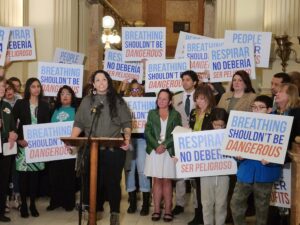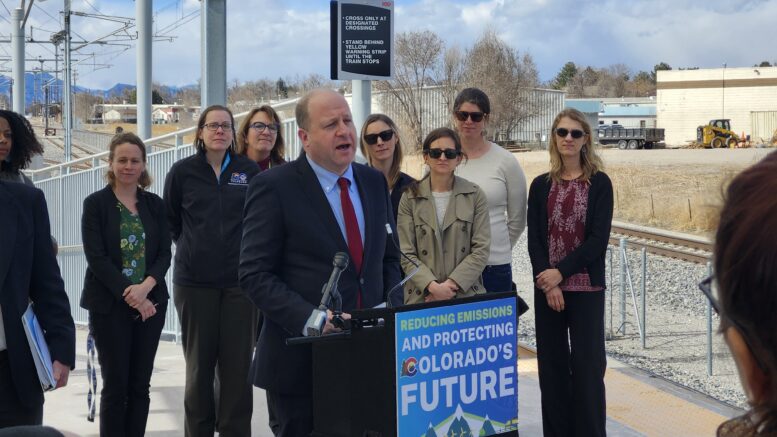Gov. Jared Polis has submitted a last-ditch waiver request to try to prevent northern Front Range gas stations from having to sell reformulated gas this summer, saying the federal mandate could cost Coloradans 60 cents per gallon and actually increase air pollution.
The request, submitted to U.S. Environmental Protection Agency Administrator Michael Regan in an April 4 letter obtained by The Sum & Substance, comes as Colorado nears a May 15 deadline to begin selling the gas in the EPA’s severe ozone nonattainment area. The requirement would last through Sept. 15 and would apply only to purchases in the nonattainment area, which runs north from Douglas County to nearly the Wyoming border in nine counties along the Interstate 25 corridor.
Reformulated gasoline is a fuel that is blended to burn more cleanly than conventional gas and reduce smog-forming and toxic pollutants, and it is required for use in severe nonattainment areas in 17 states and Washington D.C. The EPA downgraded the northern Front Range to severe nonattainment status in 2022, three years after Polis withdrew previous Gov. John Hickenlooper’s request to extend the time to reach attainment of the 2008 ozone National Ambient Air Quality Standard.
Polis first wrote the EPA in September 2022 to highlight the potential harm that an RFG mandate could have on Colorado. After that, he wrote in the April 4 letter, he engaged Energy Analysts International, a petroleum-industry analytics firm, to determine the effects of an RFG mandate on Colorado, and Polis laid out to Regan what he called those “onerous and counterproductive impacts.”
What the analysis found
First, the EAI analysis concluded, RFG prices in Denver would average at least 60 cents per gallon more than equivalent price of conventional gas. And potential spikes due to supply shortages could push that cost up to between $1.17 and $1.41 per gallon over conventional fuel, the analysis concluded.
That 60-cent figure — 20 times the estimate EPA provided Polis in 2022, the governor wrote — is much higher than in other areas because Colorado is geographically isolated, has few pipelines bringing gas into the region and has just one refinery that can produce RFG. The EAI study calculated the total potential impact could reach $431.2 million for gasoline costs and $61.8 million for diesel fuel costs, based on the expected impact of gas shortages driving RFG prices higher.

Traffic lines up in downtown Glenwood Springs in 2023.
Because that one area refinery — the Suncor Energy plant in Commerce City — produces only 38% of gas used in the Denver market, the rest of the RFG must come in via five major pipelines, which historically are constrained during the summer months, Polis wrote. Understanding that, the EAI study estimated the RFG available to the Denver area would fall 15% to 45% short of peak July demands and would have to be trucked in, which likely would boost emissions from increased truck traffic.
Polis’ administration is getting permit applications to expand fuel terminals to ensure adequate RFG storage and transportation — applications that would impact already emissions-burdened “environmental justice communities,” he wrote. To meet this challenge, his administration would have to refocus its efforts away from its clean-energy strategy toward more pipeline construction and swift approval of air permits for refiners, seemingly defeating the EPA mandate’s purpose, he added.
Waiver requirement “will create more air pollution”
With all of that in mind, Polis requested an RFG waiver by May 1.
“RFG requirements threaten Colorado’s fuel supply, will raise prices and may result in shortages at the pump,” the Democratic governor wrote in the letter. “Moreover, this antiquated mandate creates an additional unintended consequence: We are seeing significant activity and requests to expand fossil fuel facilities such as terminals in the most polluted areas of Colorado in the ozone nonattainment area to supply RFG.
“These proposed projects from your elective enforcement of this requirement will increase emissions of volatile organic compounds (VOCs) and other ozone precursor emissions in the community, and given the lack of supply in Colorado will increase intra- and interstate fuel delivery truck traffic resulting in more, not less, harmful air pollution in our most vulnerable communities,” the letter continues. “In short, forcing this requirement on Colorado will create more air pollution.”
The EPA has yet to respond to the request, sources said.
Waiver request comes amid air-quality debates
Polis’ 11-page letter comes as air pollution has become a central battle in the final weeks of the 2024 legislative session, which is required to adjourn no later than May 8. The letter’s points are likely to stir both Democratic legislators pushing for more stringent air-quality regulations and the Republicans and business leaders who argue that overly stringent rules will lead to economic losses and more hikes in the costs of living.

Commerce City Councilwoman Renée Chacon speaks at a February news conference to unveil a new slate of environmental bills.
Backers of several of those bills say they are aimed at making it harder for Suncor to get more operating permits, as they have accused state regulators of being overly lenient with penalties for its missteps and too permissive in allowing it and other emitters to expand. House Bill 1339 would nix the ability of manufacturers to pay into a fund to help achieve carbon-reduction goals, Senate Bill 166 would boost penalties for repeat air-quality offenders and HB 1330 would require more modeling before air-quality permits are issued.
In the letter, Polis argues that the steps his administration has taken since 2019 to reduce mobile-source emissions will have far greater impact on cleaning the air than the mandate to sell reformulated gas. Those include mandates to require more sales of zero-emission vehicles, incentives for the purchase of electric vehicles and expansion of vehicle-charging infrastructure, in addition to a number of other emissions-reduction rules.
In fact, Polis wrote that an analysis Colorado conducted using an EPA tool found that the RFG mandate would do almost nothing to move the state toward compliance with federal ozone standards. By eliminating two tons per day in VOC emissions, a half-ton daily of nitrous oxide emissions and no greenhouse gas emissions, its maximum benefit would be a decrease of 0.1 parts per billion in ozone concentrations, he wrote.
Disproportionate impact on low-income communities?
And that would come at a high cost for lower-income Coloradans who will bear the biggest financial impact of pricier gas, Polis wrote. Plus, gas supply shortages could “significantly hamper Colorado’s economy and undermine adequate consumer supply,” he said.
Thus, he based his request on meeting three primary conditions to seek a waiver — an inadequate supply of fuel for consumers, a public-interest need and an event that could not have been reasonably foreseen (the 2022 decision to require RFG sales).
“With an average daily fuel demand of 114 MPBD (thousand barrels per day), this means Coloradans will be spending an additional $2.9 million per day on fuel with nearly imperceptible reductions to ozone concentrations in a limited portion of the (Denver Metro/Northern Front Range) nonattainment area,” Polis wrote.
What comes next on waiver request
It remains to be seen if Polis’ plea will have any effect on the EPA in the short time it has to make a decision before refineries and terminals must begin preparing for the transition to reformulated gas. When Polis objected in summer 2022 to EPA requirements that RFG be sold in severe nonattainment areas, Regan responded by saying that the Clean Air Act requires such penalties and that there is no way around them, according to a story in the Colorado Sun.
Dan Haley, president/CEO of the Colorado Oil & Gas Association, characterized Polis’ effort as being too little too late, particularly given that he knew the EPA’s hesitancy to grant such a waiver a year-and-a-half ago. Suncor has made significant capital investments to supply Colorado with RFG during the summer and refiners have been working for months to prepare for the mandate, but none of that will stop the supply shortages or price hikes Coloradans will face, he said.
“Governor Polis had ample time to formally request a waiver on RFG,” Haley said. “Choosing to wait until the last minute is irresponsible and looks like political opportunism, and consumers will bear the brunt of this policy inaction.”
